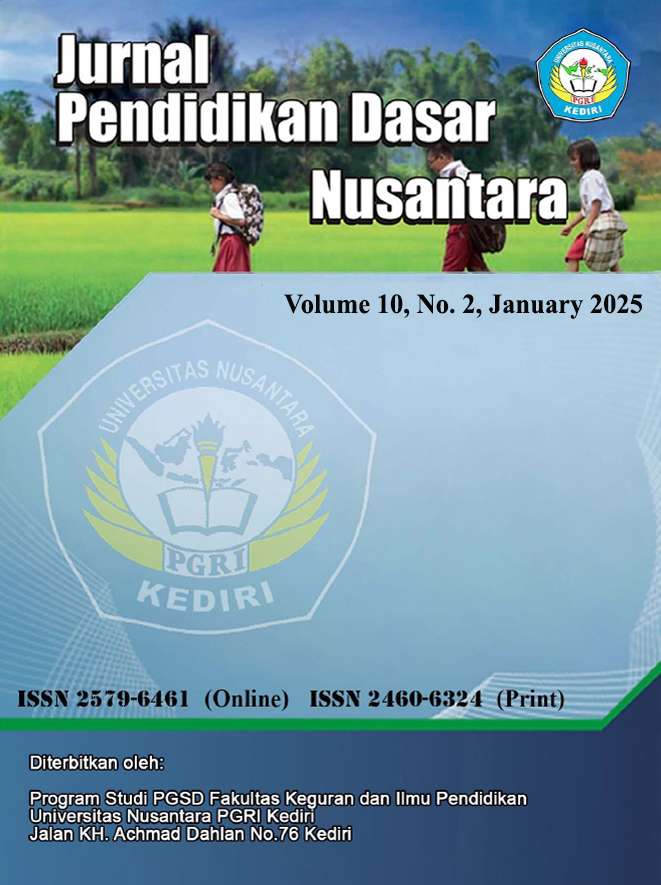Analysis of Needs for Developing KAPAL PINISI Application (Smart Literacy Adventure Activity) Based on Local Wisdom to Form 6C Skills of Indonesian Society
DOI:
https://doi.org/10.29407/jpdn.v10i2.24007Keywords:
Basic Literacy, Local Wisdom, Android ApplicationsAbstract
Basic literacy is an important foundation in education in Indonesia, but there are still challenges in literacy skills for students and teachers. Local wisdom, which should be a relevant source of learning, is often ignored in the curriculum. This study aims to describe: (1) the need to develop the KAPAL PINISI application (Smart Literacy Adventure Activities); (2) obstacles encountered in developing the application; (3) support for the development of applications based on local wisdom, with a focus on the formation of 6C skills (Critical thinking, Creativity, Collaboration, Communication, Citizenship, Character) in Indonesian society. The data collection method used a need assessment questionnaire distributed to students, teachers, and parents in several regions. This study used a mixed method approach (qualitative and quantitative) with 200 fifth grade students and 40 teachers in ten elementary schools spread across Indonesia. The data analysis technique used descriptive statistics on quantitative data and source triangulation techniques (Miles and Huberman) on qualitative data. The results of the analysis show that respondents want an application that integrates local wisdom, as well as interactive features that support collaborative and communicative learning. The obstacles faced by teachers are; never having used teaching materials based on local wisdom that are integrated into the android application. The support for the development of the KAPAL PINISI application is that the principal provides training facilities and workshops based on local wisdom to teachers, and helps teachers be creative in making teaching media. The development of the KAPAL PINISI Application based on local wisdom is an important and effective step. So that the results of the study can be used as a reference for further research in the form of developing teaching media for the KAPAL PINISI Application based on local wisdom in Indonesia.
Downloads
References
Arim Septiawan, Endang Sri Mujiwati, and Rian Damariswara. 2022. “Penerapan Multimedia Materi Teks Nonfiksi Kearifan Lokal Kediri Raya Untuk Meningkatkan Keterampilan Berfikir Kritis.” Jurnal Cakrawala Pendas 8(3):573–82. doi: 10.31949/jcp.v8i3.2430.
Bukit, Servista, and Ekayanti Tarigan. 2022. “Kompetensi Pedagogik Guru Dalam Membentuk Karakter Siswa Sekolah Dasar.” Widya Genitri : Jurnal Ilmiah Pendidikan, Agama Dan Kebudayaan Hindu 13(2):110–20. doi: 10.36417/widyagenitri.v13i2.490.
Damariswara, Rian, and Karimatus Saidah. 2021. “Kepraktisan Aplikasi Android Materi Dongeng Kelas 3 SD Berbasis Kearifan Lokal Dan Permainan Bahasa.” Jurnal Pendidikan Dasar Nusantara 6(2):197–207. doi: 10.29407/jpdn.v6i2.15252.
Erfan, Muhammad, Mohammad Archi Maulyda, and Lalu Hamdian Affandi. 2021. “Identifikasi Wawasan Literasi Dasar Guru Dalam Pembelajaran Berbasis Level Kemampuan Siswa.” Jurnal Didika : Wahana Ilmiah Pendidikan Dasar 7(1):1–18. doi: 10.29408/didika.v7i1.3520.
Hidayati, D. 2020. “Pengembangan Kurikulum Berbasis Kearifan Lokal.” Jurnal Pendidikan 12(1):25–37.
Husni, M. 2020. Komunikasi Efektif Untuk Masyarakat Umum. Bandung : Pustaka Setia.
Iswandi, H. 2020. “Pentingnya Kearifan Lokal Dalam Pendidikan.” Jurnal Pendidikan Dasar.
Kurniasih, D. 2019. Pendidikan Literasi Di Era Digital. Yogyakarta: Andi.
Laila, Alfi, C. Asri Budiningsih, and Kastam Syamsi. 2021. “Textbooks Based on Local Wisdom to Improve Reading and Writing Skills of Elementary School Students.” International Journal of Evaluation and Research in Education 10(3):886–92. doi: 10.11591/ijere.v10i3.21683.
Laila, Alfi, and Karimatus Saidah. 2020. “Analisis Potensi Dan Hambatan , Implementasi Pendidikan Berbasis Kearifan Lokal Di SDN Burengan 2 Kediri , Indonesia.” 10–12.
Mardiana, R. 2021. “Integrasi Kearifan Lokal Dalam Pembelajaran Di Sekolah Dasar.” Jurnal Pendidikan Dan Kebudayaan.
Nugroho, A. 2022. “Penerapan Teknologi Dalam Pembelajaran: Tantangan Dan Solusi.” Jurnal Teknologi Pendidikan 10(2):45–48.
Pratiwi, S. 2023. “Aplikasi Interaktif Dalam Pembelajaran: Pengaruh Terhadap Keterampilan Siswa.” Jurnal Inovasi Pendidikan 15(3):78–90.
Puspita, N. 2022. Keterampilan Literasi Dan Tantangan Zaman Modern. Surabaya: Cipta Media.
Rizki, A. 2022. Pengembangan Media Pembelajaran Berbasis Kearifan Lokal. Bandung : Alfabeta.
Saidah, Karimatus, and Rian Damariswara. 2019. “Pengembangan Bahan Ajar Materi Dongeng Berbasis Kearifan Lokal Jawa Timur Bagi Siswa Kelas III SD.” Premiere Educandum : Jurnal Pendidikan Dasar Dan Pembelajaran 9(1):73. doi: 10.25273/pe.v9i1.4320.
Sari, Maya. 2020. “Peran Guru Dalam Mengembangkan Kegiatan Literasi Dasar Siswa Kelas 1 SDIT Rabbi Radhiyya Rejang Lebong.” 07(February):1–9.
Sari, R. 2021. “Minat Baca Masyarakat Dan Upaya Peningkatannya.” Jurnal Literasi.
Setiawan, D. 2020. Pemanfaatan Teknologi Dalam Pembelajaran Kearifan Lokal. Jakarta: Rineka Cipta.
Sugiyono. 2018. Metode Penelitian Kuantitatif. edited by Setiyawami. Bandung: Alfabeta.
Sukmadinata, N. S. 2019. Dasar-Dasar Pendidikan Dan Pengajaran Di Indonesia. jakarta: Rajawali Press.
Suryani, D. 2019. Kearifan Lokal Dalam Kurikulum Sekolah Dasar. Yogyakarta: Pustaka Pelajar.
Wahyu, S. 2019. “Peran Perpustakaan Dalam Meningkatkan Literasi Masyarakat.” Jurnal Perpustakaan 6:45–60.
Wuryani, Woro, and Via Nugraha. 2021. “Pendidikan Keluarga Dalam Penguatan Literasi Dasar Pada Anak.” Semantik 10(1):101–10. doi: 10.22460/semantik.v10i1.p101-110.
Downloads
Published
Issue
Section
License
Copyright (c) 2025 Rian Damariswara , Alfi Laila , Endang Sri Mujiwati , Manfia Nurkholidah, Saiful Afandi (Author)

This work is licensed under a Creative Commons Attribution-ShareAlike 4.0 International License.
Authors who publish with this journal agree to the following terms:
- Copyright on any article is retained by the author(s).
- The author grants the journal, the right of first publication with the work simultaneously licensed under a Creative Commons Attribution License that allows others to share the work with an acknowledgment of the work’s authorship and initial publication in this journal.
- Authors are able to enter into separate, additional contractual arrangements for the non-exclusive distribution of the journal’s published version of the work (e.g., post it to an institutional repository or publish it in a book), with an acknowledgment of its initial publication in this journal.
- Authors are permitted and encouraged to post their work online (e.g., in institutional repositories or on their website) prior to and during the submission process, as it can lead to productive exchanges, as well as earlier and greater citation of published work.
- The article and any associated published material is distributed under the Creative Commons Attribution-ShareAlike 4.0 International License
































